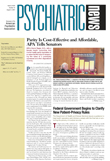At least two, and possibly three, new antipsychotic compounds are in the latter stages of development and are expected to be submitted for marketing approval within the next year.
Bristol-Myers Squibb (BMS) is codeveloping, along with Otsuka Pharmaceuticals, what is being referred to as the “next generation” of antipsychotics. Currently in Phase III clinical trials, aripiprazole, which the company intends to market under the trade name Abilitat, is the first of a new class of drugs with a novel mechanism.
Aripiprazole appears to be a partial agonist of members of the D2 dopamine receptor family—acting as an antagonist under conditions of high dopaminergic activity and as an agonist under conditions when too little dopamine is available.
So far, data from clinical trials show that aripiprazole is effective at improving both the positive and negative symptoms associated with schizophrenia better than haloperidol. Its risk of extrapyramidal symptoms (EPS) and tardive dyskensia (TD) is roughly equal to that established with risperidone. There is no evidence to date to suggest any elevation of prolactin and no significant effect on the QTc interval. In Phase III studies, about 12 percent of patients showed a 7 percent or greater increase in weight. Limited data so far show little effect on glucose or lipid metabolism, although more studies are under way.
BMS expects aripiprazole to be ready for submission of a New Drug Application (NDA) by the end of the year.
Novartis Pharmaceuticals is developing iloperidone, which will be marketed under the brand name Zomaril. Currently in late Phase III clinical trials, iloperidone appears to be a balanced antagonist of noradrenergic, dopaminergic, and serotonergic receptors with particularly high affinity for noradrenergic alpha-2c receptors.
So far, clinical trials data indicate that iloperidone’s efficacy is better than haloperidol’s with improved safety and tolerability over the older typical antipsychotic. Iloperidone has shown an EPS and TD profile comparable to that of risperidone and has not shown any significant increases in prolactin. Preliminary data show lower percentages of significant weight gain than associated with risperidone.
A spokesperson for Novartis was not able to indicate when the company expects to file an NDA for iloperidone.
French pharmaceutical conglomerate Sanofi-Synthelabo has been conducting U.S. clinical trials on amisulpride, which is available in Europe as Solian. A novel D3/D2 receptor antagonist, it acts preferentially on the limbic system and has been shown effective on both positive and negative symptoms of schizophrenia. At moderate doses of 100 mg to 400 mg, it also has a favorable side-effect profile. U.S. offices of Sanofi did not respond to inquiries by Psychiatric News for input on this article.
